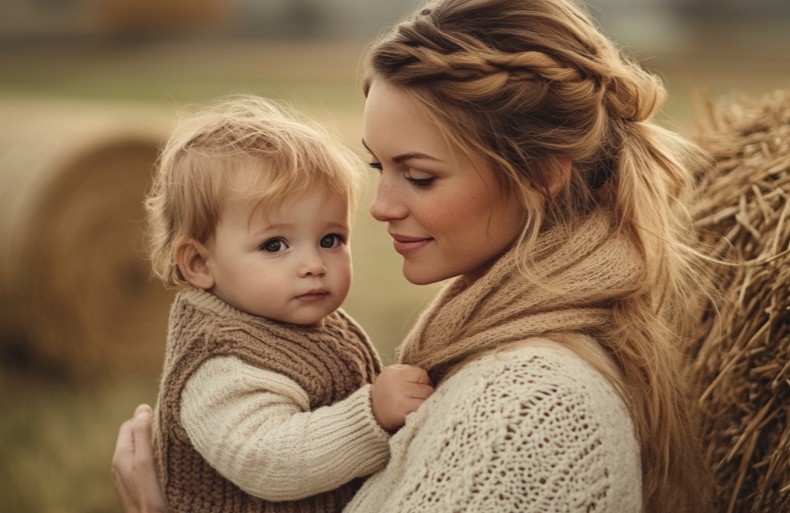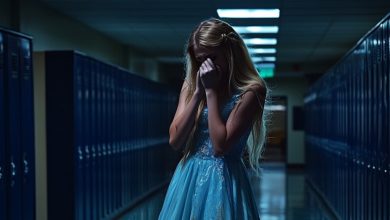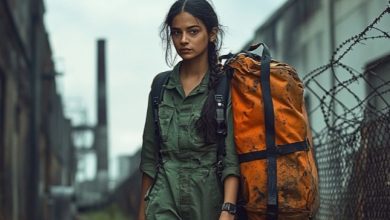I discovered a five-year-old girl in the field, brought her home, loved her deeply as mine. But who could’ve known…

I discovered a five-year-old girl in the field, brought her home, loved her as if she were my own. But who could’ve known…
“Stop!” I shouted across the entire field, but the small figure kept slowly moving between the stalks.
August burned with relentless heat. I was coming back from the river, carrying a heavy bucket of laundry, when I saw her—a little girl, no older than five, in a worn-out dress. She moved strangely, like she was in a dream.
“Hey, little one!” I set the bucket down on the edge of the path and ran toward her.
The girl turned to look at me. Her large brown eyes seemed to stare through me. A dry, dark scratch marked her cheek.
“What’s your name?” I crouched in front of her.
Silence. Only the wheat rustled in the wind around us.
“Where is your mother?” I asked gently.
She tilted her head a bit, then slowly raised her frail arm and pointed into the distance.
“There’s no one that way, dear. Come with me. You’ll get warm, and I’ll give you something to eat.”
Her hand was ice-cold despite the sweltering air. I held it and led her toward the house. She followed quietly, glancing back now and then toward the endless field.
Ivan was in the garden. When he saw us, he straightened up.
“Masha, who’s this?”
“I found her out in the field. Alone. She hasn’t said a word.”
He came closer and sat down beside us.
“Hi there. I’m Uncle Vanya. Want a carrot?”
He pulled a peeled carrot from his pocket. She took it and cautiously bit off a small piece.
“We should report this to the police,” he said under his breath.
“Let’s feed her first and get her cleaned up. Just look at her.”
In the kitchen, I sat her at the table, poured some milk, and placed bread in front of her. She ate slowly, carefully, barely making a sound. Sometimes she’d pause, like she was listening for something far away.
“Do you remember your name?”
She shook her head.
“And where are you from?”
Again, she pointed silently into space.
“Maybe she’s a gypsy?” Ivan guessed. “A caravan passed by not long ago.”
“She doesn’t look like one. More like a child who got lost.”
I took her to the bathhouse, washed away the dirt, dabbed her wounds with iodine. Beneath the grime was soft pale skin and fine, light hair. I dressed her in an old shirt of mine—it hung loosely, but it was clean.
That evening, the local officer, Stepanich, stopped by. He examined the girl and wrote down her description.
“No missing child reports in the area. I’ll check other districts. Until then?”
“She stays here with us,” I said firmly.
Ivan nodded in agreement.
“I’ll come by tomorrow.”
That night, the girl woke up in terror and ran to me. She clung to me, trembling.
“Shh, shh, it’s alright. I’m here. No one will hurt you.”
I stroked her hair until she calmed down. Then I lay beside her on the fold-out bed in the small room.
“Mom?” she whispered suddenly.
My heart skipped a beat.
“What did you say, sweetheart?”
But she had already drifted back to sleep.
A week went by. Stepanich came each day—still no news. The girl remained silent, only mumbling unintelligible words in her sleep, in a language we didn’t recognize.
“Maybe she’s a foreigner?” Ivan wondered during dinner.
“There aren’t any foreigners out here,” I replied.
She sat nearby, finishing her potatoes. Her cheeks had grown rosy, and her eyes had gained a little sparkle.
“Maybe we should give her a name?” Ivan suggested. “It would make things easier.”
“What if she already has one? What if she remembers it?”
“Then we’ll treat it as temporary.”
I looked at her. She lifted her gaze—brown eyes flecked with golden warmth.
“Katya,” I said. “She looks like my grandmother Katya when she was little. The same eyes.”
The girl smiled for the first time since she arrived.
Autumn came early. We baptized her Katya, and slowly, she began to adjust. She helped with chores: fed chickens, gathered eggs. She started talking—first single words, then short sentences. Nothing about her past.
“Mom, water,” she said one morning.
I froze with the kettle in my hand. Ivan looked away, his eyes gleaming.
“What did you just say?”
“Water, please… Mom.”
I hugged her tight, unable to let go.
In October, a letter came from the district office—no one was searching for the girl. They recommended sending her to an orphanage.
“We won’t give her up,” Ivan said. “We’ll apply for guardianship.”
“And if her real parents turn up?”
“We’ll deal with it then. But not an orphanage.”
We began the bureaucratic process—documents, interviews, inspections. Authorities checked our home, questioned our income. Katya clung to my skirt when strangers came, silent.
“She’s a bit unusual,” one social worker said. “Maybe she needs specialists?”
“She’s not strange,” I replied. “She’s afraid. What she needs is a home, not therapy.”
By New Year’s, everything was in order. Katya was officially our ward.
“You’re ours now,” Ivan said, lifting her. “Forever.”
She wrapped her arms around his neck and whispered:
“Papa…”
Something strange happened that winter. One night, I woke to find Katya standing at the window, staring at the snowy field.
“Katya, what are you doing?”
“They left,” she whispered. “Gone forever.”
“Who left, darling?”
She turned to me, her face serious, almost grown-up in the moonlight.
“I don’t remember. But they’re not coming back.”
I embraced her, led her away from the window, and tucked her into bed. After that, she never stood at the window at night again.
Spring came, and Katya bloomed. She played outside, laughed, made up songs. She learned to read almost instantly, as if she had always known how. She drew odd shapes—spirals, symbols, mysterious designs.
“What is this?” I’d ask.
“It just comes,” she’d say calmly.
In May, my sister came from the city. When she saw Katya, she gasped.
“Masha, she looks just like you as a child! She could be your daughter!”
She stared at Katya—and truly, they did resemble each other. Same cheekbones, same eye shape. Only her hair was lighter.
“It’s fate,” my sister whispered. “It can’t be coincidence. God brought her to you.”
In summer, exactly a year after I found her in the field, Katya woke up and quietly said:
“Mom, I remembered.”
My heart stopped.
“What did you remember?”
“That I was always yours. It just took me a long time to find you.”
I embraced her, tears welling up uncontrollably. Just then, Ivan walked in.
“What’s going on?”
“Papa,” Katya smiled through her tears, reaching for him, “I remembered: I’ve always been your daughter.”
The years flew by. Katya grew into a kind and clever girl. Top of her class, always helping out, and the heart of every group of children in the village.
At fourteen, she won the district math competition.
“You need to go study in the city,” Ivan told her. “University, career—you’ve got a future.”
“But what about you?” she asked, concerned.
“We’ll be here. This is your home. You’ll come back—always family.”
That evening, we sat on the porch, the three of us. Katya between us, her head resting on my shoulder.
“Mom, tell me again how you found me.”
I repeated the story for the hundredth time. She listened closely, smiling.
“I found you in the field when you were five, and I raised you like my own. Now you call me Mom. That’s the best thing in my life,” I ended.
“You know,” she said thoughtfully, “I have this dream sometimes. I’m standing in white light, and a woman tells me, ‘Go—they’re waiting.’ Then she points to our field.”
“Maybe it was an angel,” Ivan suggested.
“Maybe…” she nodded softly.
When Katya turned eighteen, she was accepted into medical school. Ivan and I saw her off—tears in all our eyes. She came home for holidays, and every time, the house was full of life again.
“Mom, I met someone,” she confessed in her third year. “His name’s Sergey. He’s also studying to be a doctor.”
“Bring him over. We’ll meet him.”
Sergey turned out to be a decent young man—serious, respectful, hardworking. Ivan liked him immediately.
“He’s solid,” Ivan said afterward. “You can rely on him.”
They married in the village. Katya in white—absolutely radiant. She cried tears of joy the whole day.
“Thank you for everything,” she whispered while hugging us tightly.
Two years later, they had a son—little Ivan, after his grandfather. Then a daughter—Masha, named after me. Katya and Sergey worked at the district hospital, but they came to visit every weekend. The house filled once more with children’s laughter and warmth.
One day, when little Ivan turned five—the same age Katya was when we first met—something strange happened.
We were all out walking and reached that familiar field. Ivan stopped and pointed ahead.
“Mom, someone’s standing there.”
We looked—there was no one. Just golden wheat swaying in the breeze.
“There’s nothing, dear.”
“There is! A lady in a white dress. She’s waving and saying thank you.”
Katya turned pale and sat down beside us.
“What else is she doing?”
“She’s just smiling,” the boy answered.
He saw no more, but from that moment something shifted in Katya. She grew calmer, more grounded, like a chapter had quietly closed.
That evening, we sat on the porch. The grandchildren were asleep; Ivan and Sergey played chess quietly by the table.
“Mom,” Katya said softly, “I think I’ve started to remember.”
“What do you remember, sweetheart?”
“Not everything. Just a feeling. Like I was guided to you. Like I was sent away… so you’d have a daughter, and I’d have a family.”
“That’s nonsense,” I replied, though my voice trembled a little.
“No—it’s not. I’m yours. Not by blood, but by heart. That’s what matters.”
I hugged her tightly, just like I had done years ago when she was still that frightened little girl in my arms.
“You’re ours,” I whispered. “The most precious one of all.”
“And you know something, Mom? When little Ivan was born, I understood that the circle was complete. The love you gave me—I pass it on now. And it will keep going.”
We sat in silence, watching the sun sink slowly beyond the horizon. That same field in view—the place where everything began.
A story about a child from nowhere who became everything. A story about how real family isn’t always blood—it’s love, care, and a lifetime shared.
“It’s getting cold,” Ivan said. “Time to go inside.”
We stood up together. Katya hugged us both.
“I love you. Thank you… for not giving me away. For believing in me.”
“We love you, daughter,” I said. “Family isn’t always born. Sometimes, it’s found. And you are our miracle.”
And that was nothing but the pure truth.



